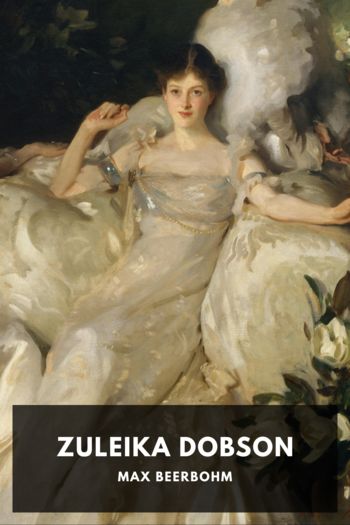Zuleika Dobson, Max Beerbohm [e ink ebook reader TXT] 📗

- Author: Max Beerbohm
Book online «Zuleika Dobson, Max Beerbohm [e ink ebook reader TXT] 📗». Author Max Beerbohm
“As eligible? Who were they?” frowned the Duke.
“Oh, Archduke this, and Grand Duke that, and His Serene Highness the other. I have a wretched memory for names.”
“And my name, too, will soon escape you, perhaps?”
“No. Oh, no. I shall always remember yours. You see, I was in love with you. You deceived me into loving you …” She sighed. “Oh, had you but been as strong as I thought you … Still, a swain the more. That is something.” She leaned forward, smiling archly. “Those studs—show me them again.”
The Duke displayed them in the hollow of his hand. She touched them lightly, reverently, as a tourist touches a sacred relic in a church.
At length, “Do give me them,” she said. “I will keep them in a little secret partition of my jewel-case.” The Duke had closed his fist. “Do!” she pleaded. “My other jewels—they have no separate meanings for me. I never remember who gave me this one or that. These would be quite different. I should always remember their history … Do!”
“Ask me for anything else,” said the Duke. “These are the one thing I could not part with—even to you, for whose sake they are hallowed.”
Zuleika pouted. On the verge of persisting, she changed her mind, and was silent.
“Well!” she said abruptly, “how about these races? Are you going to take me to see them?”
“Races? What races?” murmured the Duke. “Oh yes. I had forgotten. Do you really mean that you want to see them?”
“Why, of course! They are great fun, aren’t they?”
“And you are in a mood for great fun? Well, there is plenty of time. The Second Division is not rowed till half-past four.”
“The Second Division? Why not take me to the First?”
“That is not rowed till six.”
“Isn’t this rather an odd arrangement?”
“No doubt. But Oxford never pretended to be strong in mathematics.”
“Why, it’s not yet three!” cried Zuleika, with a woebegone stare at the clock. “What is to be done in the meantime?”
“Am not I sufficiently diverting?” asked the Duke bitterly.
“Quite candidly, no. Have you any friend lodging with you here?”
“One, overhead. A man named Noaks.”
“A small man, with spectacles?”
“Very small, with very large spectacles.”
“He was pointed out to me yesterday, as I was driving from the Station … No, I don’t think I want to meet him. What can you have in common with him?”
“One frailty, at least: he, too, Miss Dobson, loves you.”
“But of course he does. He saw me drive past. Very few of the others,” she said, rising and shaking herself, “have set eyes on me. Do let us go out and look at the Colleges. I do need change of scene. If you were a doctor, you would have prescribed that long ago. It is very bad for me to be here, a kind of Cinderella, moping over the ashes of my love for you. Where is your hat?”
Looking round, she caught sight of herself in the glass. “Oh,” she cried, “what a fright I do look! I must never be seen like this!”
“You look very beautiful.”
“I don’t. That is a lover’s illusion. You yourself told me that this tartan was perfectly hideous. There was no need to tell me that. I came thus because I was coming to see you. I chose this frock in the deliberate fear that you, if I made myself presentable, might succumb at second sight of me. I would have sent out for a sack and dressed myself in that, I would have blacked my face all over with burnt cork, only I was afraid of being mobbed on the way to you.”
“Even so, you would but have been mobbed for your incorrigible beauty.”
“My beauty! How I hate it!” sighed Zuleika. “Still, here it is, and I must needs make the best of it. Come! Take me to Judas. I will change my things. Then I shall be fit for the races.”
As these two emerged, side by side, into the street, the Emperors exchanged stony sidelong glances. For they saw the more than normal pallor of the Duke’s face, and something very like desperation in his eyes. They saw the tragedy progressing to its foreseen close. Unable to stay its course, they were grimly fascinated now.
VI“The evil that men do lives after them; the good is oft interred with their bones.” At any rate, the sinner has a better chance than the saint of being hereafter remembered. We, in whom original sin preponderates, find him easier to understand. He is near to us, clear to us. The saint is remote, dim. A very great saint may, of course, be remembered through some sheer force of originality in him; and then the very mystery that involves him for us makes him the harder to forget: he haunts us the more surely because we shall never understand him. But the ordinary saints grow faint to posterity; whilst quite ordinary sinners pass vividly down the ages.
Of the disciples of Jesus, which is he that is most often remembered and cited by us? Not the disciple whom Jesus loved; neither of the Boanerges, nor any other of them who so steadfastly followed Him and served Him; but the disciple who betrayed Him for thirty pieces of silver. Judas Iscariot it is who outstands, overshadowing those other fishermen. And perhaps it was by reason of this precedence that Christopher Whitrid, Knight, in the reign of Henry VI, gave the name of Judas to the College which he had





Comments (0)